447 scholarly books by Seagull Books and 18
start with I
447 scholarly books by Seagull Books and 18
447 scholarly books by Seagull Books
18 start with I start with I
18 start with I start with I
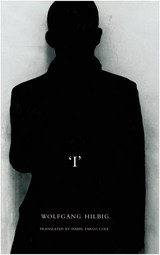
'I'
Wolfgang Hilbig
Seagull Books, 2019
The perfect book for paranoid times, “I” introduces us to W, a mere hanger-on in East Berlin’s postmodern underground literary scene. All is not as it appears, though, as W is actually a Stasi informant who reports to the mercurial David Bowie look-alike Major Feuerbach. But are political secrets all that W is seeking in the underground labyrinth of Berlin? In fact, what W really desires are his own lost memories, the self undone by surveillance: his "I."
First published in Germany in 1993 and hailed as an instant classic, “I” is a black comedy about state power and the seductions of surveillance. Its penetrating vision seems especially relevant today in our world of cameras on every train, bus, and corner. This is an engrossing read, available now for the first time in English.
“[Hilbig writes as] Edgar Allan Poe could have written if he had been born in Communist East Germany.”—Los Angeles Review of Books
First published in Germany in 1993 and hailed as an instant classic, “I” is a black comedy about state power and the seductions of surveillance. Its penetrating vision seems especially relevant today in our world of cameras on every train, bus, and corner. This is an engrossing read, available now for the first time in English.
“[Hilbig writes as] Edgar Allan Poe could have written if he had been born in Communist East Germany.”—Los Angeles Review of Books
[more]
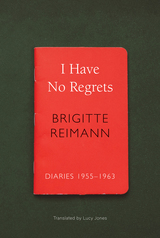
I Have No Regrets
Diaries, 1955-1963
Brigitte Reimann
Seagull Books, 2019
Frank and refreshing, Brigitte Reimann’s collected diaries provide a candid account of life in socialist Germany.
With an upbeat tempo and amusing tone, I Have No Regrets contains detailed accounts of the author’s love affairs, daily life, writing, and reflections. Like the heroines in her stories, Reimann was impetuous and outspoken, addressing issues and sensibilities otherwise repressed in the era of the German Democratic Republic. She followed the state’s call for artists to leave their ivory towers and engage with the people, moving to the new town of Hoyerswerda to work part-time at a nearby industrial plant and run writing classes for the workers. Her diaries and letters provide a fascinating parallel to her fictional writing. By turns shocking, passionate, unflinching, and bitter—but above all life-affirming—they offer an unparalleled insight into what life was like during the first decades of the GDR.
With an upbeat tempo and amusing tone, I Have No Regrets contains detailed accounts of the author’s love affairs, daily life, writing, and reflections. Like the heroines in her stories, Reimann was impetuous and outspoken, addressing issues and sensibilities otherwise repressed in the era of the German Democratic Republic. She followed the state’s call for artists to leave their ivory towers and engage with the people, moving to the new town of Hoyerswerda to work part-time at a nearby industrial plant and run writing classes for the workers. Her diaries and letters provide a fascinating parallel to her fictional writing. By turns shocking, passionate, unflinching, and bitter—but above all life-affirming—they offer an unparalleled insight into what life was like during the first decades of the GDR.
[more]

I Just Let Life Rain Down on Me
Selected Letters and Reflections
Rahel Levin Varnhagen
Seagull Books, 2024
A personal look into the mind of one of Europe’s first and foremost women of letters.
At times poetic but not a poem, prosaic but not an essay, a letter is often pure writing for writing’s sake. Such is the case for Rahel Varnhagen von Ense, née Levin, the illustrious German-Jewish Berlin literary salon hostess from the early nineteenth century. She penned over ten thousand letters to more than three hundred recipients, including princes, philosophers, poets, family members, and the family cook. Written with a wink at posterity, collected and first published after her passing by her husband, Karl August Varnhagen von Ense, these letters constitute a singular contribution to German literature.
Varied in subject—from family affairs to linguistic, literary, and pressing social concerns—the poignant lyricism of her letters is all the more remarkable when we take into account that High German was not her first language; she grew up speaking, reading, and writing primarily Yiddish. Her shaky social status as a woman and a member of a precarious minority, combined with an astounding lucidity and a rare capacity to put her thoughts into words, made her a force to be reckoned with in her lifetime and thereafter as one of Germany’s preeminent women of letters. As we see in I Just Let Life Rain Down on Me, her voice is as fresh and original as that of any of the recognized poets and thinkers of her day. As Rahel herself put it: “[O]ur language is our lived life; I invented mine for my own purposes, I was less able than many others to make use of preconceived turns of phrase, which is why mine are often clumsy, and in all respects faulty, but always true.”
Compiled and translated by Peter Wortsman, this rewarding volume affords English-speaking readers the first privileged peek at the mindset of one of Europe’s first and foremost women of letters.
At times poetic but not a poem, prosaic but not an essay, a letter is often pure writing for writing’s sake. Such is the case for Rahel Varnhagen von Ense, née Levin, the illustrious German-Jewish Berlin literary salon hostess from the early nineteenth century. She penned over ten thousand letters to more than three hundred recipients, including princes, philosophers, poets, family members, and the family cook. Written with a wink at posterity, collected and first published after her passing by her husband, Karl August Varnhagen von Ense, these letters constitute a singular contribution to German literature.
Varied in subject—from family affairs to linguistic, literary, and pressing social concerns—the poignant lyricism of her letters is all the more remarkable when we take into account that High German was not her first language; she grew up speaking, reading, and writing primarily Yiddish. Her shaky social status as a woman and a member of a precarious minority, combined with an astounding lucidity and a rare capacity to put her thoughts into words, made her a force to be reckoned with in her lifetime and thereafter as one of Germany’s preeminent women of letters. As we see in I Just Let Life Rain Down on Me, her voice is as fresh and original as that of any of the recognized poets and thinkers of her day. As Rahel herself put it: “[O]ur language is our lived life; I invented mine for my own purposes, I was less able than many others to make use of preconceived turns of phrase, which is why mine are often clumsy, and in all respects faulty, but always true.”
Compiled and translated by Peter Wortsman, this rewarding volume affords English-speaking readers the first privileged peek at the mindset of one of Europe’s first and foremost women of letters.
[more]
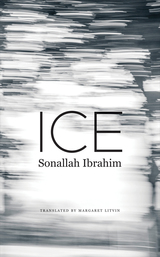
Ice
Sonallah Ibrahim
Seagull Books, 2019
The year is 1973. An Egyptian historian, Dr. Shukri, pursues a year of non-degree graduate studies in Moscow, the presumed heart of the socialist utopia. Through his eyes, the reader receives a guided tour of the sordid stagnation of Brezhnev-era Soviet life: intra-Soviet ethnic tensions; Russian retirees unable to afford a tin of meat; a trio of drunks splitting a bottle of vodka on the sidewalk; a Kirgiz roommate who brings his Russian girlfriend to live in his four-person dormitory room; black-marketeering Arab embassy officials; liberated but insecure Russian women; and Arab students’ debates about the geographically distant October 1973 War. Shukri records all this in the same numbly factual style familiar to fans of Sonallah Ibrahim’s That Smell, punctuating it with the only redeeming sources of beauty available: classical music LPs, newly acquired Russian vocabulary, achingly beautiful women, and strong Georgian tea.
Based on Ibrahim’s own experience studying at the All-Russian Institute of Cinematography in Moscow from 1971 to 1973, Ice offers a powerful exploration of Arab confusion, Soviet dysfunction, and the fragility of leftist revolutionary ideals.
Based on Ibrahim’s own experience studying at the All-Russian Institute of Cinematography in Moscow from 1971 to 1973, Ice offers a powerful exploration of Arab confusion, Soviet dysfunction, and the fragility of leftist revolutionary ideals.
[more]
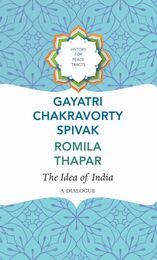
The Idea of India
A Dialogue
Gayatri Chakravorty Spivak and Romila Thapar
Seagull Books, 2024
A lively discussion between two eminent Indian academics that examines what it means to be an Indian.
Through a stimulating dialogue, two old friends trace the history of the idea of India through digressions, anecdotes, and observations. Historian Romila Thapar and theorist Gayatri Chakravorty Spivak reflect on the challenges posed by essentialism and exclusion whenever cultures attempt to define and assert themselves. They also emphasize the role of education in fostering a more inclusive and accurate understanding of the nation’s complex history. Their conversation revolves around the narratives that have shaped Indian identity—from Vedic times to the present—and those whose voices and visions for this land remain unheard and unseen.
Ranging from nationalism to religion and beyond, TheIdea of India discusses an urgent question: What does it mean to be an Indian in contemporary society?
Through a stimulating dialogue, two old friends trace the history of the idea of India through digressions, anecdotes, and observations. Historian Romila Thapar and theorist Gayatri Chakravorty Spivak reflect on the challenges posed by essentialism and exclusion whenever cultures attempt to define and assert themselves. They also emphasize the role of education in fostering a more inclusive and accurate understanding of the nation’s complex history. Their conversation revolves around the narratives that have shaped Indian identity—from Vedic times to the present—and those whose voices and visions for this land remain unheard and unseen.
Ranging from nationalism to religion and beyond, TheIdea of India discusses an urgent question: What does it mean to be an Indian in contemporary society?
[more]
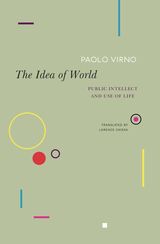
The Idea of World
Public Intellect and Use of Life
Paolo Virno
Seagull Books, 2022
A philosophical exploration of what capitalistic societies truly mean for the individual.
A short vade mecum for unrepentant materialism, The Idea of World collects three essays by Italian philosopher Paulo Virno that are intricately wrapped around one another. The first essay, “Mundanity,” tries to clarify what the term “world,” as referred to as the perceptual and historical context of our existence, means—both with and against Kant and Wittgenstein. How should we understand expressions such as “worldly people,” “the course of the world,” or “getting by in this world”? The second, “Virtuosity and Revolution,” is a minor political treatise. Virno puts forward a set of concepts capable of confronting the magnetic storm that has knocked out the compasses that every reflection on the public sphere has relied on since the seventeenth century. The third, “The Use of Life”, is the shorthand delineation of a research program on the notion of use. What exactly are we doing when we use a hammer, a time span, or an ironic sentence? And, above all, what does the use of the self—of one’s own life, which lies at the basis of all uses—amount to in human existence?
Presenting his ideas in three distinct vignettes, Virno examines how the philosophy of language, anthropology, and political theory are inextricably linked.
A short vade mecum for unrepentant materialism, The Idea of World collects three essays by Italian philosopher Paulo Virno that are intricately wrapped around one another. The first essay, “Mundanity,” tries to clarify what the term “world,” as referred to as the perceptual and historical context of our existence, means—both with and against Kant and Wittgenstein. How should we understand expressions such as “worldly people,” “the course of the world,” or “getting by in this world”? The second, “Virtuosity and Revolution,” is a minor political treatise. Virno puts forward a set of concepts capable of confronting the magnetic storm that has knocked out the compasses that every reflection on the public sphere has relied on since the seventeenth century. The third, “The Use of Life”, is the shorthand delineation of a research program on the notion of use. What exactly are we doing when we use a hammer, a time span, or an ironic sentence? And, above all, what does the use of the self—of one’s own life, which lies at the basis of all uses—amount to in human existence?
Presenting his ideas in three distinct vignettes, Virno examines how the philosophy of language, anthropology, and political theory are inextricably linked.
[more]
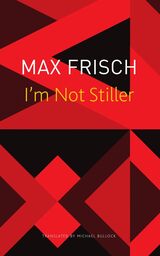
I’m Not Stiller
Max Frisch
Seagull Books, 1958
A renowned novel of self-deceit and self-acceptance.
Arrested and imprisoned in a small Swiss town, a prisoner begins this book with an exclamation: “I'm not Stiller!” He claims that his name is Jim White, and that he has been jailed under false charges and under the wrong identity. To prove he is who he claims to be, he confesses to three unsolved murders and recalls in great detail an adventuresome life in America and Mexico among cowboys and peasants, in back alleys and docks. He is consumed by “the morbid impulse to convince,” but no one believes him.
This is a harrowing account—part Kafka, part Camus—of the power of self-deception and the freedom that ultimately lies in self-acceptance. Simultaneously haunting and humorous, I'm Not Stiller has come to be recognized as one of the major post-war works of fiction and a masterpiece of German literature.
Arrested and imprisoned in a small Swiss town, a prisoner begins this book with an exclamation: “I'm not Stiller!” He claims that his name is Jim White, and that he has been jailed under false charges and under the wrong identity. To prove he is who he claims to be, he confesses to three unsolved murders and recalls in great detail an adventuresome life in America and Mexico among cowboys and peasants, in back alleys and docks. He is consumed by “the morbid impulse to convince,” but no one believes him.
This is a harrowing account—part Kafka, part Camus—of the power of self-deception and the freedom that ultimately lies in self-acceptance. Simultaneously haunting and humorous, I'm Not Stiller has come to be recognized as one of the major post-war works of fiction and a masterpiece of German literature.
[more]

In a Cabin, in the Woods
Michael Krüger
Seagull Books, 2024
A personal perspective on the challenges of living through a global pandemic.
When the COVID-19 pandemic hit, Michael Krüger was suffering from severe shingles and just beginning treatment for leukemia. Because his immune system was so compromised that even a cough would have knocked him flat, he had to stay away from people. He retired to a wooden house near Lake Starnberg in Germany, and from there he dispatched his poetic messages. Krüger’s meditations from quarantine were printed for many months in the magazine of the Süddeutsche Zeitung and met with an enthusiastic response. In a Cabin, in the Woods collects fifty tableaux of nature, images of the immediate surroundings of a restricted life that also look beyond the horizon. At the same time, these poems look inward to explore transience, illness, and death. Humorous and melancholy, these are studies of the world made with the tiniest compass—meditations on nature and the nature of self that touch us all.
When the COVID-19 pandemic hit, Michael Krüger was suffering from severe shingles and just beginning treatment for leukemia. Because his immune system was so compromised that even a cough would have knocked him flat, he had to stay away from people. He retired to a wooden house near Lake Starnberg in Germany, and from there he dispatched his poetic messages. Krüger’s meditations from quarantine were printed for many months in the magazine of the Süddeutsche Zeitung and met with an enthusiastic response. In a Cabin, in the Woods collects fifty tableaux of nature, images of the immediate surroundings of a restricted life that also look beyond the horizon. At the same time, these poems look inward to explore transience, illness, and death. Humorous and melancholy, these are studies of the world made with the tiniest compass—meditations on nature and the nature of self that touch us all.
[more]
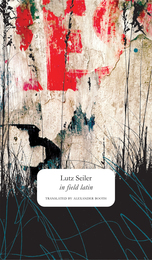
in field latin
Lutz Seiler
Seagull Books, 2016
Lutz Seiler grew up in the former East Germany and has lived most of his life outside Berlin. His poems, not surprisingly, are works of the border, the in-between, and the provincial, marked by whispers, weather, time’s relentless passing, the dead and their ghosts. It is a contemporary poetry of landscape, fully aware of its literary and non-literary forebears, a walker’s view of the place Seiler lives, anchored by close, unhurried attention to particulars. With his precise, memorable language—rendered here in compelling English—Seiler has pulled off a difficult feat: recontextualizing and radically personalizing the long tradition of German nature writing for the twenty-first century.
[more]
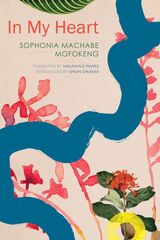
In My Heart
Sofonia Machabe Mofokeng
Seagull Books, 2021
One of few books translated into English from Sesotho, In My Heart introduces a long-neglected voice to global readership.
Elsewhere Texts, edited by Gayatri Chakraborty Spivak and Hosam Aboul-Ela, presents radical new engagements with non-European literary cultures. This volume, the latest in this ambitious series, is a brilliant collection of essays originally written in Sesotho by Sophonia Machabe Mofokeng. Often confined to the role of “native informants” in the nineteenth and twentieth centuries, writers working in African languages laid the foundation for the politics and poetics of decolonization and are legendary among their own communities of readers, though their work remains little known elsewhere. In My Heart belongs to this tradition of colonial renegades. Writing in the 1950s during the cataclysmic events of apartheid that were transforming life in South Africa, Mofokeng offers a series of meditations that provide his readers with a Sesotho worldview outside the categories authorized by colonial knowledge. In My Heart, expertly translated by Nhlanhla Maake, introduces a significant African thinker’s influential work to a global readership.
Elsewhere Texts, edited by Gayatri Chakraborty Spivak and Hosam Aboul-Ela, presents radical new engagements with non-European literary cultures. This volume, the latest in this ambitious series, is a brilliant collection of essays originally written in Sesotho by Sophonia Machabe Mofokeng. Often confined to the role of “native informants” in the nineteenth and twentieth centuries, writers working in African languages laid the foundation for the politics and poetics of decolonization and are legendary among their own communities of readers, though their work remains little known elsewhere. In My Heart belongs to this tradition of colonial renegades. Writing in the 1950s during the cataclysmic events of apartheid that were transforming life in South Africa, Mofokeng offers a series of meditations that provide his readers with a Sesotho worldview outside the categories authorized by colonial knowledge. In My Heart, expertly translated by Nhlanhla Maake, introduces a significant African thinker’s influential work to a global readership.
[more]
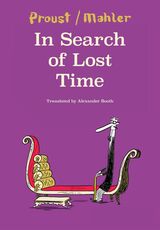
In Search of Lost Time
Mahler after Proust
Nicolas Mahler
Seagull Books, 2022
A twist on the French literary classic In Search of Lost Time told through Nicolas Mahler’s distinctive graphic novel style.
Marcel Proust’s In Search of Lost Time is one of the most important works of French literature—if not the most important. Reading it can be life-changing. Nicolas Mahler’s comic is not a retelling of this classic, nor a shortened version of Proust’s monumental work. Rather, it is a surprisingly funny graphic novel, comically disrespectful of the celebrated work yet completely permeated by Proustian spirit. Complemented by his clear and sparse illustrations, Mahler’s minimal nature of text use is easy on the eye, even for those uninitiated into graphic novels. For long-time fans of graphic novels, it is a perfect entry into a beloved literary classic.
A compact picture stream through time and space, Mahler’s In Search of Lost Time is a brilliantly complex house of mirrors replete with Proustian motives and perceptions.
Marcel Proust’s In Search of Lost Time is one of the most important works of French literature—if not the most important. Reading it can be life-changing. Nicolas Mahler’s comic is not a retelling of this classic, nor a shortened version of Proust’s monumental work. Rather, it is a surprisingly funny graphic novel, comically disrespectful of the celebrated work yet completely permeated by Proustian spirit. Complemented by his clear and sparse illustrations, Mahler’s minimal nature of text use is easy on the eye, even for those uninitiated into graphic novels. For long-time fans of graphic novels, it is a perfect entry into a beloved literary classic.
A compact picture stream through time and space, Mahler’s In Search of Lost Time is a brilliantly complex house of mirrors replete with Proustian motives and perceptions.
[more]
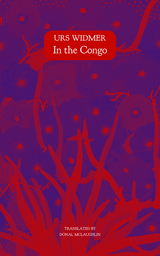
In the Congo
Urs Widmer
Seagull Books, 2015
Kuno, a male nurse in a Swiss retirement home, has a new inmate: his father. In the confines of their new home, the pair does something surprising—they finally begin to talk. Kuno had always regarded his father as a boring man without a history or a destiny, until they are thrust together and he learns that his father risked his life in the war. Stunned, Kuno embarks on a journey into his own psyche, taking him to the depths of the Congo. Here, longings awaken and dreams come true—rays of light in the darkness, meetings with kings, seductive women, and the songs of the jungle. This alluring far-away place he once regarded as the heart of darkness suddenly becomes an exciting locale of lunacy, wildness, and tests of inner strength.
In Urs Widmer’s characteristic style, In the Congo is a riveting yarn, threading through not only the relationship between a father and son, but that of Africa and Europe. Translated by Donal McLaughlin, this novel will delight Widmer fans the world over and will turn our notions of colonialism on their heads.
In Urs Widmer’s characteristic style, In the Congo is a riveting yarn, threading through not only the relationship between a father and son, but that of Africa and Europe. Translated by Donal McLaughlin, this novel will delight Widmer fans the world over and will turn our notions of colonialism on their heads.
[more]

In the Forest of Metropoles
Karl-Markus Gauß
Seagull Books, 2024
A chronicle of the diversity and wealth of cultures, predominantly from Eastern Europe, that have played a formative role in shaping contemporary Europe but now risk being forgotten.
A Herodotus of Mitteleuropa, cultural historian Karl-Markus Gauß is essential reading for anyone trying to understand the breadth and complexities of cultures and societies in Europe before, during, and after its decades of division in the twentieth century.
In this book, Gauß takes his readers on a thirteen-station journey across Europe. From Brussels to Istanbul and from Naples to Opole, Gauß weaves a Sebaldian web of connection and coincidence into a hybrid cultural history. Significantly, Gauß’s metropoles are not the well-trodden, thoroughly explored, and minutely documented megalopolises and cultural capitals that have been mythologized by writers great and small. There are no visits to Berlin, Paris, Rome, or Madrid, although he does make time for Vienna, where he looks not for imperial remnants, but for traces of genius unrecognized by most. Gauß’s lodestars are small but cosmopolitan towns on the periphery, such as Slaghenaufi, Vacaresti, Fontevraud, Dragatus, Vrzdenec, and Sélestat. In these far-flung towns, Gauß assembles a canon of overlooked humanists, expelled or extinguished by political and historical forces that swept the continent.
A Herodotus of Mitteleuropa, cultural historian Karl-Markus Gauß is essential reading for anyone trying to understand the breadth and complexities of cultures and societies in Europe before, during, and after its decades of division in the twentieth century.
In this book, Gauß takes his readers on a thirteen-station journey across Europe. From Brussels to Istanbul and from Naples to Opole, Gauß weaves a Sebaldian web of connection and coincidence into a hybrid cultural history. Significantly, Gauß’s metropoles are not the well-trodden, thoroughly explored, and minutely documented megalopolises and cultural capitals that have been mythologized by writers great and small. There are no visits to Berlin, Paris, Rome, or Madrid, although he does make time for Vienna, where he looks not for imperial remnants, but for traces of genius unrecognized by most. Gauß’s lodestars are small but cosmopolitan towns on the periphery, such as Slaghenaufi, Vacaresti, Fontevraud, Dragatus, Vrzdenec, and Sélestat. In these far-flung towns, Gauß assembles a canon of overlooked humanists, expelled or extinguished by political and historical forces that swept the continent.
[more]
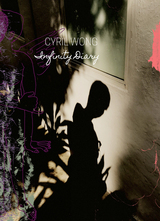
Infinity Diary
Cyril Wong
Seagull Books, 2020
This volume of poems by Cyril Wong, one of the leading figures of poetry in Singapore, reflects the many ways in which love between two men can unfold, balancing emotional outpourings with meditations on the nature of relationships. The poetry punctures the sometimes oppressive reality of life in a city that is hypermodern yet far from free and, through twists and turns, ultimately lifts the reader to a place beyond pleasure and pain. Sensual, anecdotal and, of course, confessional, Infinity Diary charts an evolution in the work of one of Asia’s most intimate English-language poets.
[more]
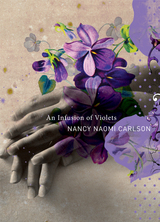
An Infusion of Violets
Nancy Naomi Carlson
Seagull Books, 2019
Using the same musical sense of language she applies to her translations, Nancy Naomi Carlson masterfully interprets herself in An Infusion of Violets. The sometimes erotic, sometimes melancholy landscapes she creates as the self-appointed sitar’s “ragged throat, pitched / between here and when, / caught in quartertones,” take our breath away. Carlson describes an interior world where tears can produce “so much salt a body floats away,” where “music tuned to loss descends with rain,” and where hope is placed in the “kill-cure.” Here we encounter Carlson’s ex-husbands and luminaries such as Rachmaninoff and Monet, among others. Filled with striking images and sensuous language, An Infusion of Violets is an evocative mix of formal and free-verse poems.
[more]
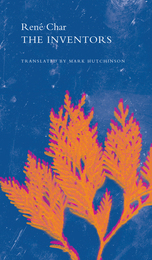
The Inventors
And Other Poems
René Char
Seagull Books, 2015
One of the foremost poets of the French Resistance, René Char has been hailed by Donald Revell as “the conscience of modern French poetry.” Translated by Mark Hutchinson, The Inventors is a companion volume to Char’s critically acclaimed Hypnos. It gathers more than forty poems that represent a cross-section of Char’s mature work, spanning from 1936 to 1988. All three genres of Char’s work are represented here: verse poems, prose poems, and the abrupt, lapidary propositions for which he is best known. These maxima sententia combine the terseness of La Rochefoucauld with the probing and sometimes riddling character of the fragments of Heraclitus.
The Inventors includes a brief introduction to Char’s life and work, as well as a series of notes on the backstories of the works, which explain allusions that may not be immediately familiar to the English-speaking reader. These new translations stay true to the originals, while at the same time conveying much of the music and beauty of the French poems.
Praise for René Char
“Char, I believe, is a poet who will tower over twentieth-century French poetry.”—George Steiner
The Inventors includes a brief introduction to Char’s life and work, as well as a series of notes on the backstories of the works, which explain allusions that may not be immediately familiar to the English-speaking reader. These new translations stay true to the originals, while at the same time conveying much of the music and beauty of the French poems.
Praise for René Char
“Char, I believe, is a poet who will tower over twentieth-century French poetry.”—George Steiner
[more]

Is a Single Teachable Indian Past Possible Today?
Janaki Nair
Seagull Books, 2024
An accessible contribution to the ongoing discussion about the quality and politics of social science textbooks in India.
More than ever before, the school history textbook in India has become an embattled object and the subject of many contestations from both above and below. It is vulnerable not only to the political vagaries of governments but also to the exclusive claims of myriad communities and groups to their sense of the past. What is the future of India’s textbook, arguably the most important repository of the country’s national past? Is a single teachable past even possible any longer?
In this essay, Janaki Nair uses the Indian predicament to discuss the possibility of building up a “historical temper” in the Indian classroom. Sharing examples from her unique position as a professional historian with sustained experience in the field of pedagogy, Nair invites reflections on the prospect of cultivating a historical temper that can help the teacher equip students to grapple with history.
More than ever before, the school history textbook in India has become an embattled object and the subject of many contestations from both above and below. It is vulnerable not only to the political vagaries of governments but also to the exclusive claims of myriad communities and groups to their sense of the past. What is the future of India’s textbook, arguably the most important repository of the country’s national past? Is a single teachable past even possible any longer?
In this essay, Janaki Nair uses the Indian predicament to discuss the possibility of building up a “historical temper” in the Indian classroom. Sharing examples from her unique position as a professional historian with sustained experience in the field of pedagogy, Nair invites reflections on the prospect of cultivating a historical temper that can help the teacher equip students to grapple with history.
[more]
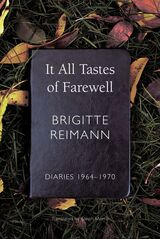
It All Tastes of Farewell
Diaries, 1964–1970
Brigitte Reimann
Seagull Books, 2016
Continuing where Reimann's earlier book of diaries, I Have No Regrets, left off, in 1964, this volume is a compelling and frank account of one woman’s life and loves in 1960s East Germany.
It All Tastes of Farewell is a frank account of one woman’s life and loves in 1960s East Germany. As a writer, Brigitte Reimann could not help but tell a compelling story, and that is born out here in her diaries, which are gripping as any novel. She recorded only what mattered: telling details, emotional truths, and political realities. Never written for publication and first published in full in German only after the fall of the Berlin Wall, these diaries offer a unique record of what it felt like to live in a country that no longer exists, was represented for years largely through Cold War propaganda, and is still portrayed in fairy-tale Stasi dramas. Here we get a sense of lived experience as if Doris Lessing or Edna O’Brien had been allowed in with their notebooks. This volume continues where her earlier book of diaries, I Have No Regrets, left off, in 1964. It sees Reimann grow wistful and at times bitter, as her love life, her professional life, and her health all suffer. Yet throughout she retains a lively appetite for new experiences and a dedication to writing. Finally, she finds security in a surprising new love, and although she died soon after this volume ends, the novel she was writing was to become a much-read cult hit after her death.
A remarkable document from a time and place that we still struggle to see clearly, It All Tastes of Farewell is unforgettable, a last gift from an essential writer.
It All Tastes of Farewell is a frank account of one woman’s life and loves in 1960s East Germany. As a writer, Brigitte Reimann could not help but tell a compelling story, and that is born out here in her diaries, which are gripping as any novel. She recorded only what mattered: telling details, emotional truths, and political realities. Never written for publication and first published in full in German only after the fall of the Berlin Wall, these diaries offer a unique record of what it felt like to live in a country that no longer exists, was represented for years largely through Cold War propaganda, and is still portrayed in fairy-tale Stasi dramas. Here we get a sense of lived experience as if Doris Lessing or Edna O’Brien had been allowed in with their notebooks. This volume continues where her earlier book of diaries, I Have No Regrets, left off, in 1964. It sees Reimann grow wistful and at times bitter, as her love life, her professional life, and her health all suffer. Yet throughout she retains a lively appetite for new experiences and a dedication to writing. Finally, she finds security in a surprising new love, and although she died soon after this volume ends, the novel she was writing was to become a much-read cult hit after her death.
A remarkable document from a time and place that we still struggle to see clearly, It All Tastes of Farewell is unforgettable, a last gift from an essential writer.
[more]
READERS
Browse our collection.
PUBLISHERS
See BiblioVault's publisher services.
STUDENT SERVICES
Files for college accessibility offices.
UChicago Accessibility Resources
home | accessibility | search | about | contact us
BiblioVault ® 2001 - 2024
The University of Chicago Press









